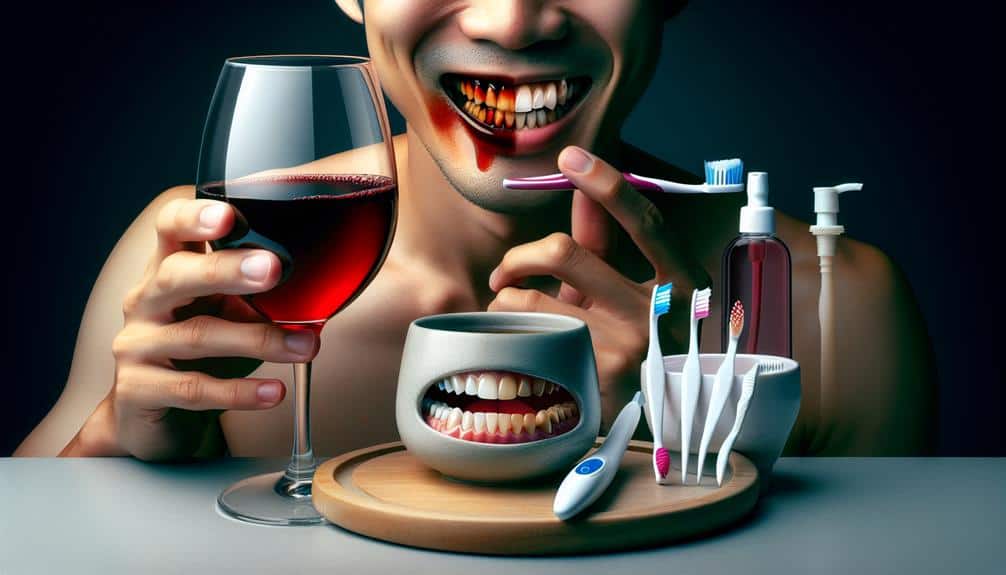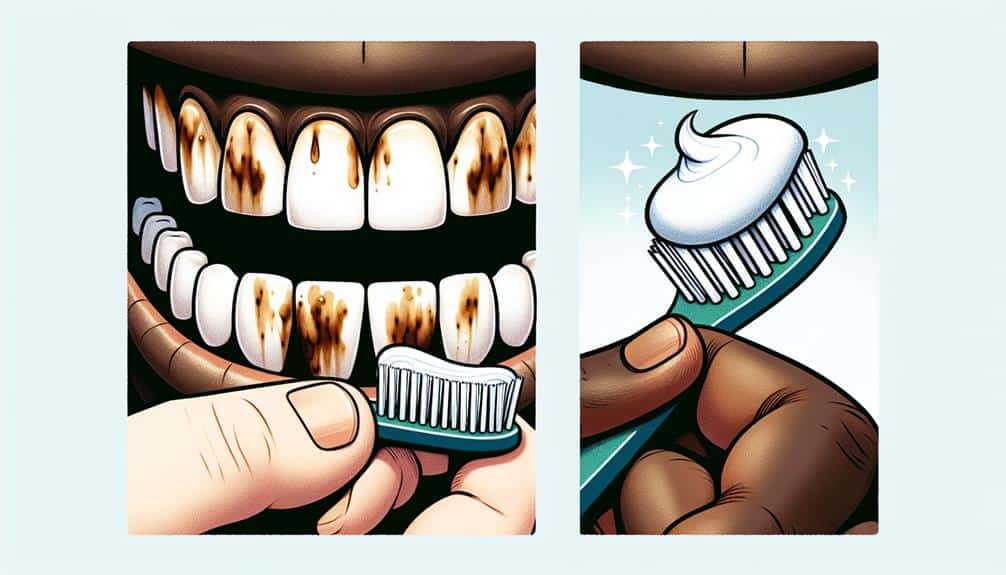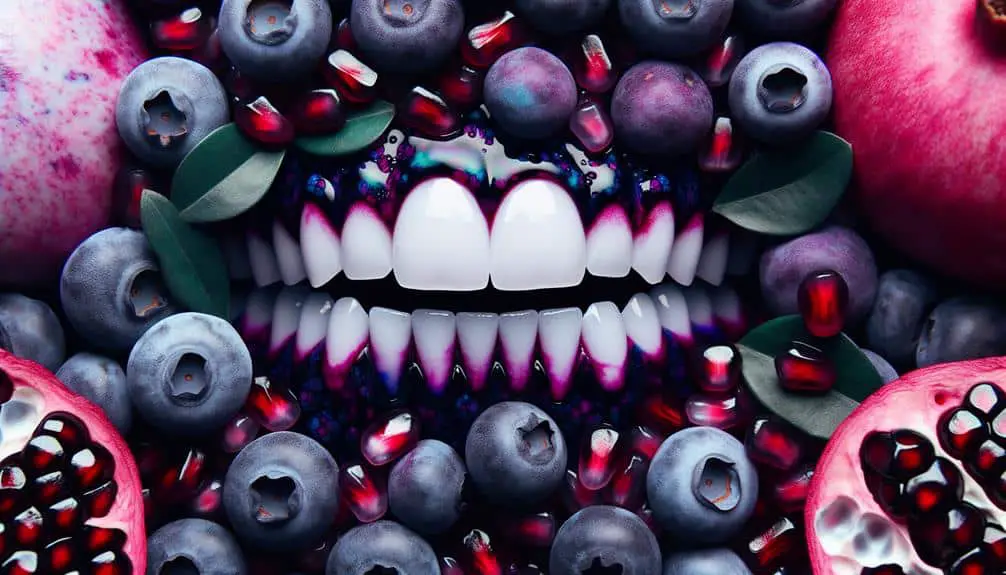To combat tannins teeth yellowing, it's important to limit foods rich in tannins like red wine, tea, and coffee. Alternatives such as white wine or herbal teas can be chosen. Drinking through a straw, brushing your teeth within 30 minutes of consuming tannin-rich foods, and rinsing your mouth with water can help prevent tannins from sticking to your teeth. Additionally, using whitening toothpaste with abrasive particles and considering natural remedies like baking soda can be beneficial. Regular dental checkups, cleanings, and professional whitening treatments if needed can further prevent tannins teeth yellowing.
Baking soda benefits in combating stains by acting as a gentle abrasive and neutralizing acids. By taking these steps, you can help maintain a brighter smile and reduce the impact of tannins on your teeth over time.
Key Points
- Limit tannin-rich foods like red wine to prevent teeth staining.
- Drink through a straw to minimize direct tannin contact with teeth.
- Brush teeth promptly after consuming tannin-rich foods to prevent staining.
- Rinse mouth with water after tannin exposure to reduce adhesion.
- Consider professional whitening treatments for stubborn tannin-induced stains.
Limit Tannin-Rich Foods
Have you thought about reducing your intake of tannin-rich foods to help combat teeth yellowing? Tannins are natural compounds found in various foods and beverages, such as red wine, tea, coffee, and certain fruits like grapes and pomegranates. These compounds can contribute to teeth yellowing by staining the enamel over time. To prevent this discoloration, you may want to contemplate limiting your consumption of tannin sources and exploring alternatives.
While tannins are known for their astringent properties and health benefits, excessive exposure can lead to teeth staining. By decreasing your intake of tannin-rich foods and beverages, you can minimize the risk of yellowing and maintain a brighter smile. Instead of completely eliminating tannin sources from your diet, you can also explore alternatives like white wine, herbal teas, and light-colored fruits to enjoy a variety of flavors while protecting your teeth.
Incorporating these simple changes into your diet can make a significant difference in preventing teeth yellowing caused by tannins. By being mindful of your consumption and opting for alternatives, you can enjoy a radiant smile without compromising on your favorite foods and drinks.
Drink Through a Straw
To minimize the contact of tannins with your teeth and reduce the risk of staining, consider using a straw when drinking beverages rich in tannins. Straw benefits include directing the liquid to the back of your mouth, bypassing your teeth and reducing the exposure of tannins to your enamel. By sipping through a straw, you can enjoy your favorite tannin-rich drinks while lessening their potential effects on your teeth.
Tannin avoidance is important for maintaining a bright smile. Straws provide a simple yet effective solution to this issue. Opt for a reusable straw made of materials like stainless steel or silicone to reduce waste and protect the environment while safeguarding your teeth from tannin-induced discoloration.
Next time you reach for a glass of red wine or a cup of black tea, grab a straw to help shield your teeth from tannins. This small adjustment in your drinking habits can go a long way in preserving your radiant smile.
Brush After Consumption
When combatting tannin-induced teeth yellowing, remember to brush after consumption to prevent staining.
The timing of brushing is important, ideally within 30 minutes of consuming tannin-rich foods or beverages.
Make sure you use proper brushing technique, focusing on all tooth surfaces to effectively remove tannins and prevent discoloration.
Timing of Brushing
Brushing your teeth after consuming foods or beverages high in tannins can help combat yellowing caused by these compounds. When it comes to timing your brushing routine, consider the following:
- Wait 30 minutes: Allow some time before brushing to prevent damaging softened enamel.
- Use a soft-bristled brush: Opt for gentle bristles to protect enamel.
- Select a fluoride toothpaste: Fluoride helps strengthen teeth and prevents decay.
- Brush twice a day: Maintain a consistent brushing schedule to promote oral health.
Proper Brushing Technique
For excellent oral health, make sure you brush your teeth using the correct technique after consuming foods or beverages high in tannins. To maintain a healthy smile, consider incorporating efficient flossing techniques into your oral care routine. Proper flossing helps remove plaque and food particles between your teeth that brushing alone may miss.
Additionally, when choosing toothpaste, opt for options that contain fluoride to strengthen enamel and prevent cavities. Mouthwash can also be beneficial, as it can reach areas in your mouth that brushing and flossing may not access. Electric toothbrushes are another outstanding tool to ensure a thorough clean, as they can help remove plaque more effectively than manual brushing.
Rinse With Water
To combat tannins teeth yellowing effectively, consider rinsing with water after consuming staining beverages or foods. Water benefits in this situation are significant as they help in preventing tannins from adhering to your teeth and causing discoloration.
Here are some key points to keep in mind when rinsing with water:
- Timing is essential: Rinse your mouth with water immediately after consuming tannin-rich foods or drinks to reduce the chances of stains setting in.
- Use lukewarm water: Lukewarm water is effective in removing tannins without damaging your teeth or gums.
- Swish thoroughly: Make sure to swish the water around your mouth for about 30 seconds to make sure it reaches all areas where tannins might be lingering.
- Follow up with a mouthwash: Consider using an alcohol-free mouthwash after rinsing with water to further cleanse your mouth and maintain oral hygiene.
Incorporating the habit of rinsing with water after tannin exposure can go a long way in preventing teeth yellowing and maintaining a bright smile.
Use Whitening Toothpaste
Consider including whitening toothpaste into your oral care routine to help combat tannins teeth yellowing and maintain a bright smile. Whitening toothpaste contains abrasive particles or chemicals that work to remove surface stains on your teeth, including those caused by tannins. Look for toothpaste that includes ingredients like hydrogen peroxide, baking soda, or activated charcoal, known for their stain-fighting properties. These toothpaste options can help break down and remove tannin stains, restoring the natural whiteness of your teeth.
When using whitening toothpaste, it's important to follow the instructions carefully to achieve optimal results. Additionally, be mindful of potential side effects such as increased tooth sensitivity. If you experience any discomfort, consider alternating between whitening and regular toothpaste or using a toothpaste designed for sensitive teeth.
To enhance the whitening effects of toothpaste, you can also incorporate natural remedies like brushing with a mixture of lemon juice and baking soda occasionally. However, be cautious with this method as the acidity of lemon juice can erode tooth enamel. Charcoal toothpaste is another popular option that may help remove surface stains effectively. Remember to consult with your dentist before trying new whitening products to assure they're suitable for your oral health.
Eat Crunchy Fruits and Vegetables
Incorporate crunchy fruits and vegetables into your diet to help naturally clean and brighten your teeth. These foods act as nature's toothbrush, aiding in removing plaque and stains from your teeth.
Here are four reasons why adding crunchy fruits and vegetables can benefit your oral health:
- Natural Scrubbing Action: Crunchy fruits like apples and vegetables like carrots require a lot of chewing, which helps scrub the surface of your teeth, reducing plaque buildup.
- Increased Saliva Production: The act of chewing crunchy foods stimulates saliva production, which helps wash away food particles and neutralize acids that can erode enamel.
- Rich in Fiber: Fruits and vegetables are rich in fiber, which encourages saliva production and promotes good digestion, leading to overall better oral hygiene.
- Nutrient-Rich: Crunchy fruits and vegetables are packed with essential vitamins and minerals that contribute to strong teeth and gums, supporting your oral health alongside regular dental flossing and oral hygiene practices.
Try Oil Pulling
By incorporating oil pulling into your oral care routine, you can explore a natural method to enhance oral health and combat teeth yellowing. Oil pulling is an ancient practice that involves swishing oil around in your mouth to remove bacteria, debris, and toxins. This technique is believed to help improve overall oral hygiene and promote fresher breath. Natural remedies like oil pulling can offer several oral health benefits. The oil acts as a cleansing agent, pulling out impurities and bacteria from the teeth and gums. It may also help reduce plaque buildup, prevent cavities, and promote healthier gums.
To try oil pulling, simply take a tablespoon of coconut, sesame, or sunflower oil and swish it around in your mouth for about 15-20 minutes. Make sure not to swallow the oil as it contains the impurities it has pulled from your mouth. Afterward, spit out the oil and rinse your mouth with water. Incorporating oil pulling into your daily routine can be a beneficial addition to your oral care practices, enhancing your overall oral health naturally.
Visit Your Dentist Regularly
Regular dental checkups and professional cleanings are essential to maintaining peak oral health. These routine visits allow your dentist to detect any early signs of tannin-related teeth yellowing and provide appropriate treatments.
Regular Dental Checkups
Maintain your oral health by scheduling routine visits to your dentist for regular checkups. Regular dental checkups are vital for ensuring your oral hygiene and preventing dental issues. Here are some reasons why these checkups are essential:
- Early Detection: Regular visits can help catch any dental problems early, preventing them from becoming more serious.
- Professional Guidance: Dentists can provide personalized advice on oral hygiene practices tailored to your specific needs.
- Preventive Care: Through professional cleanings and treatments, dentists can help prevent tannins teeth yellowing and other oral health issues.
- Overall Health: Oral health is linked to overall health, making regular dental checkups an important part of your preventive care routine.
Regular visits to your dentist can help maintain a healthy smile and prevent tannins teeth yellowing.
Professional Cleanings Recommended
Scheduling regular professional cleanings with your dentist is vital to maintaining excellent oral health and preventing tannins teeth yellowing. Professional cleanings play an essential role in removing plaque buildup, which can lead to staining and discoloration caused by tannins in foods and beverages.
During these cleanings, your dentist or dental hygienist uses specialized tools to clean areas of your teeth that may be difficult to reach with regular brushing and flossing, helping to prevent tannins from causing yellowing over time. By staying consistent with these professional cleanings, you not only improve your dental hygiene but also safeguard your oral health against tannins teeth yellowing, ensuring a brighter and healthier smile.
Use Baking Soda
To help combat tannin-induced teeth yellowing, consider incorporating baking soda into your oral hygiene routine. Baking soda offers several benefits for natural teeth whitening due to its mild abrasive properties and alkaline nature. Here are some tips for effectively using baking soda:
- DIY Toothpaste: Create a simple toothpaste by mixing baking soda with water to form a paste. Gently brush your teeth with this mixture to help remove surface stains and brighten your smile.
- Baking Soda Mouthwash: Add a small amount of baking soda to water and swish it around in your mouth for a minute or two. This can help neutralize acids and reduce bacteria that contribute to yellowing.
- Weekly Baking Soda Scrub: Once a week, sprinkle a small amount of baking soda on your toothbrush along with your regular toothpaste. Brush gently to buff away stains without damaging your enamel.
- Consult Your Dentist: Before making significant changes to your oral care routine, consult your dentist to make sure baking soda is a suitable option for your teeth and gums.
Consider Professional Whitening
Considering your oral health and the effectiveness of different methods, exploring professional whitening options with your dentist can provide significant improvements in combating tannin-induced teeth yellowing. Professional whitening treatments offer advanced solutions that can effectively address stubborn stains caused by tannins in beverages like tea or red wine.
One key benefit of opting for professional whitening is the ability to achieve professional results. Dentists use high-quality whitening agents that are more potent than over-the-counter products, guaranteeing a more noticeable and longer-lasting outcome. This approach allows for a more customized treatment plan tailored to your specific needs and desired level of whitening.
Moreover, professional whitening procedures take into account teeth sensitivity concerns. Your dentist can monitor the process to minimize discomfort and adjust the treatment as needed to ensure a comfortable experience. By choosing professional whitening, you not only enhance the aesthetics of your smile but also benefit from the expertise of dental professionals who prioritize both effectiveness and safety.
Frequently Asked Questions
Can Tannins in Tea and Coffee Still Cause Teeth Yellowing if Consumed Through a Straw?
When sipping tea or coffee through a straw, tannins can still contribute to teeth yellowing. While a straw may minimize direct contact, tannins can still stain teeth over time. Consider tooth sensitivity when exploring this method.
How Often Should I Brush My Teeth After Consuming Tannin-Rich Foods or Drinks?
After indulging in tannin-rich treats, be a vigilant guardian of your enamel health. Brushing frequency is your weapon against staining foes. Mouthwash, your trusty sidekick, aids in the battle for a radiant smile.
Are There Any Specific Types of Whitening Toothpaste That Work Best for Combating Tannin Teeth Yellowing?
To combat tannin teeth yellowing, consider using whitening strips or mouthwash formulated to tackle discoloration. Pair these products with an electric toothbrush for thorough cleaning and flossing to remove plaque buildup effectively.
How Long Should I Wait to Brush My Teeth After Consuming Tannin-Rich Foods or Drinks?
After consuming tannin-rich foods or drinks, wait about 30 minutes before brushing your teeth to allow the enamel to re-mineralize. This waiting time can enhance the effectiveness of brushing. Alternatives include rinsing with water or chewing sugar-free gum for prevention.
Are There Any Potential Side Effects of Oil Pulling for Reducing Tannins Teeth Yellowing?
To reduce tannins teeth yellowing, consider oil pulling. Benefits may include plaque reduction and fresher breath. Risks such as stomach upset or lipid pneumonia can occur if oil is swallowed. Use proper techniques for stain prevention.



